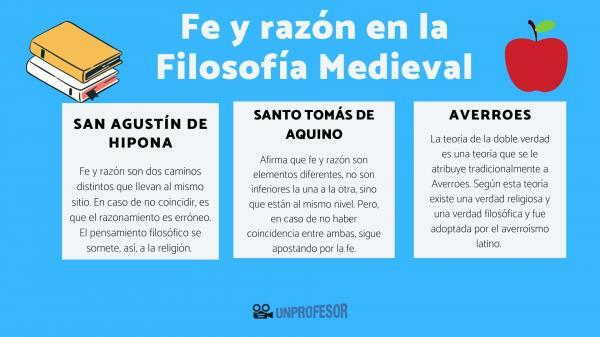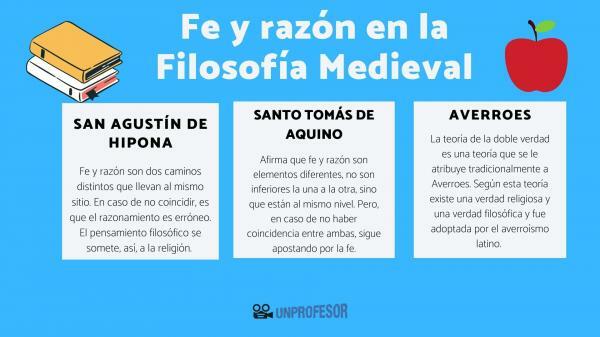FAITH and REASON in medieval philosophy
For Paula Rodriguez. Updated: 6 October 2020

In this lesson from a TEACHER we are going to explain the problem of faith and reason in medieval philosophy. These are two fundamental questions in the Middle Ages, which will be covered by Saint Augustine and Saint Thomas, mainly. In medieval times religion was the basis of everything, of literature, of art and of course, of philosophy and thought.
The problem of faith and reason will also be valued by Averroes, a philosopher of Islamic origin and a great commentator on Aristotelian texts and in fact, it was this thinker who introduced Aristotle's philosophy in the West. If you want to know more about the problem of faith and reason in medieval philosophy, keep reading this article by a PROFESSOR.
One of the fathers of the Catholic Church that he fought against the heresies of the Manichaeans, Donatists, and Pelagianism. He is one of the highest representatives of Christian thought, along with Santo Tomás. He was known by the name of the "Doctor of Grace". Among his works of philosophy and theology, the Confessions of him and The City of God stand out.
For Saint Augustine, faith and reason are two different paths that lead to the same place. If they do not coincide, the reasoning is wrong. Philosophical thought thus submits to religion.
Faith, claims one of humanity's greatest thinkers, is necessary condition for understanding Christianity and the mystery of revelation, but not enough. In order to truly penetrate the mystery, reason is necessary. Because without reason, there is also no faith.
Faith and reason are different, but they must lean on each other. They have to find a balance. They have different characteristics, and different fields of application, and there is also a hierarchy. Faith is always superior to reason, when in doubt, since it comes directly from God.
“The Lord, through his words and actions, has exhorted those whom he has called to salvation to have faith first. But next, speaking of the gift that he should give to the believers, he did not say: `` This is eternal life: that believe ', but rather:' This is eternal life: that they know you, the only God, and the one you have sent, 'Jesus Christ' ”.
Saint Augustine would say "Believe to understand" and "understand to believe." In this way, Saint Augustine wants to understand faith, demonstrate its veracity, using reason to do so.
St Thomas is considered the main of the scholasticism and defender of natural theology. He commented, like Averroes, the works of Aristotle, showing its compatibility with the Catholic religion. He was very influenced by the Neoplatonism of Saint Augustine and the Aristotelianism of Averroes and Maimonides.
Two of his most important works are the Summa theologiae and the Summa against gentiles and he is said to be one of the greatest philosophers of western literature.
St. Thomas states that faith and reason are different elementsThey are not inferior to each other, but are on the same level. But, if there is no coincidence between the two, keep betting on faith.
Philosophy does not contradict religion and it is a valid way to reach true knowledge.
“What is naturally innate in reason is so true that there is no possibility of thinking about its falsehood. And even less is it lawful to believe false what we possess by faith, since it has been confirmed by God. Therefore, since only the false is contrary to the true, as their very definitions clearly prove, there is no possibility that the rational principles are contrary to the truth of the faith ”.
Reason, says Santo Tomás, is an instrument that human beings use to know the world that surrounds them. However, if reason contradicts faith, then it is an error of reason. God cannot be wrong.
The starting point of the thought of Saint Thomas Aquinas is the consideration that the truths of faith are superior to the truths of reason. This is so because faith has been revealed by God, and God is infallible. Reason does not serve as a tool to get to know God, however, it is capable of reaching a true knowledge of the world.
The thought of Santo Tomás opens, in this way, the way to other philosophers who begin to consider, against tradition, the preponderant role of reason over faith. Of the philosophical thought, in front of the religion.
The double truth theory It is a theory that is traditionally attributed to Averroes and that starts from the consideration that both the truth of the truths of reason are as valid as the truths of revelation. And there may be a contradiction between the two. There are, therefore, two truths.
According to this theory there is a religious truth and a philosophical truth and it was adopted by Latin Averroism.
St. Thomas opposes this theory by stating:
"Philosophy and theology are two different but not opposed disciplines, they come together in the preambles of faith and both are complement and assist each other (reason with its dialectical weapons, faith as the extrinsic criterion) in the search for the truth"



